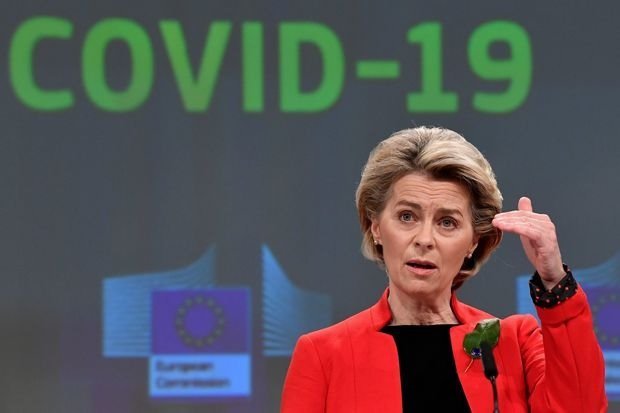“We have the possibility to forbid planned exports. That is the message to AstraZeneca,” warned European Commission President Ursula von der Leyen, in a speech made on Sunday.
The European Commission “will adopt on Thursday a revision of the transparency and export authorisation mechanism for the outflow of Covid-19 vaccines from the EU,” Commission chief spokesman Eric Mamer announced this during a press briefing in Brussels on Wednesday.
To understand exactly how the mechanism will be modified it will be necessary to wait EU leaders meet at the Thursday summit,” Mamer explained.
While Mamer would not provide any details about the revision, previous statements have made clear what the Commission has in mind.
Commission Vice President Maros Sefcovic on Wednesday reiterated in a press conference on Wednesday that the EU wants “reciprocity” and “proportionality” from its export partners.
“The European Union does not aim for a general Covid-19 vaccine export ban but wants to make sure the 27-nation bloc gets its fair share of jabs,” the Sefcovic insisted.
“We are not seeking an outright ban on vaccine exports, but we expect manufacturers to live up to their contractual obligations,” he warned.
It is possible that pharmaceutical companies that do not respect contractual commitments will face actions by the Commission, Sefcovic continued. “To date, the company that continues to under-deliver is AstraZeneca, and, as a result, several EU states are in serious difficulty with regard to vaccination plans.”
Sefcovic does seem to be targeting the United Kingdom. “The UK has a de facto export ban,” Sefcovic insisted, “although not de jure ban,” he noted.
“Our partners should understand that, in this difficult phase, we want our fair share of the vaccines that are produced in the EU,” added Sefcovic.
Speaking at the press conference, Economy Commissioner Paolo Gentiloni recalled that “there are factories that produce AstraZeneca vaccine in the UK and so far there have been no doses that have moved from the UK to the EU. Surely the UK would not accept it if the opposite were true. This is all simply about reciprocity, and not trade wars .”
EU Commission Director General of Health of the Commission Sandra Gallina recently pointed out that, for the doses of AstraZeneca produced in the United Kingdom, a “UK first” clause is part of the contracts, so that the production is not being equally shared with the EU.
The result is that the EU has received 10 million doses so far out of the close to 42 million exported from the EU.
Gallina complained that AstraZeneca is not delivering what it has promised.
“We were expecting deliveries in the hundreds [of millions] and we are not even getting a quarter of such deliveries,” she said, adding that the failure to deliver hit particularly hard since AstraZeneca promised to deliver in the first two quarters 300 million jabs.
“Of the five plants that are producing in the contracts signed between the EU and AstraZeneca, the company, is using only two in Europe,” Gallina said, one in Belgium and another in the Netherlands, to deliver to Europe.
The dispute about the export of vaccines is complicated by the overall decay of the framework of EU-UK relations. Another dispute has broken out regarding the ‘Good Friday’ governing border controls between Ireland and the UK territory of Northern Ireland.





Click here to change your cookie preferences